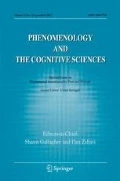Abstract
The notion of ‘givenness of consciousness’ needs further elucidation. On the one hand, I agree with Lyyra (this volume) that one sense for ‘givenness of consciousness’ is not enough to account for consciousness and self-consciousness. On the other hand, I will argue that Lyyra’s paper is problematic precisely because he fails to consider one basic sense for ‘givenness of consciousness’. Lyyra and I thus agree that there must be (at least) two senses for ‘givenness of consciousness’; we disagree, however about which modes of givenness are involved.
Similar content being viewed by others
Notes
Note that here we operated an interesting change in our frame of investigation. The most common question asked when investigating self-consciousness is “who”: who are you conscious of: yourself or not? Here, the framework is different and involves checking whether the “what” question can be asked meaningfully. If yes, then the transitive consciousness at stake may be a form of self-consciousness or not, and asking the “who” question becomes relevant only then. Conversely, if the “what” question cannot be asked meaningfully, then the form of consciousness involved is intransitive and the “who” question is just as irrelevant as the “what” question. Does it mean that at this intransitive level, there is no object and no subject? This is what the detractors of this position seem to think, wrongly, when they qualify this state as an “internal glow”. Obscure notion indeed. Which should not be confused with the form of intransitive self-consciousness at stake here.
despite problems related to such use. For a discussion, see Legrand, D. (2007).
References
Legrand, D. (2007). Subjectivity and the body: introducing basic forms of self-consciousness. Consciousness and Cognition, 16(3), 577–582. doi:10.1016/j.concog.2007.06.011.
Lyyra, P. (2008). Two senses for ‘givenness of consciousness’. Phenomenology and the Cognitive Sciences. doi:10.1007/s11097-008-9110-6.
Merleau-Ponty, M. (1945). Phénoménologie de la perception. Colin Smith Trans. 1962. Routledge Classics. Paris: Tel Gallimard.
Rosenthal, D. (2005). Consciousness and mind. Oxford, England: Oxford University Press.
Zahavi, D. (2005). Subjectivity and selfhood: Investigating the first-person perspective. Bradford Books, Cambridge, MA: The MIT.
Author information
Authors and Affiliations
Corresponding author
Rights and permissions
About this article
Cite this article
Legrand, D. Two senses for ‘givenness of consciousness’. Phenom Cogn Sci 8, 89–94 (2009). https://doi.org/10.1007/s11097-008-9116-0
Published:
Issue Date:
DOI: https://doi.org/10.1007/s11097-008-9116-0




